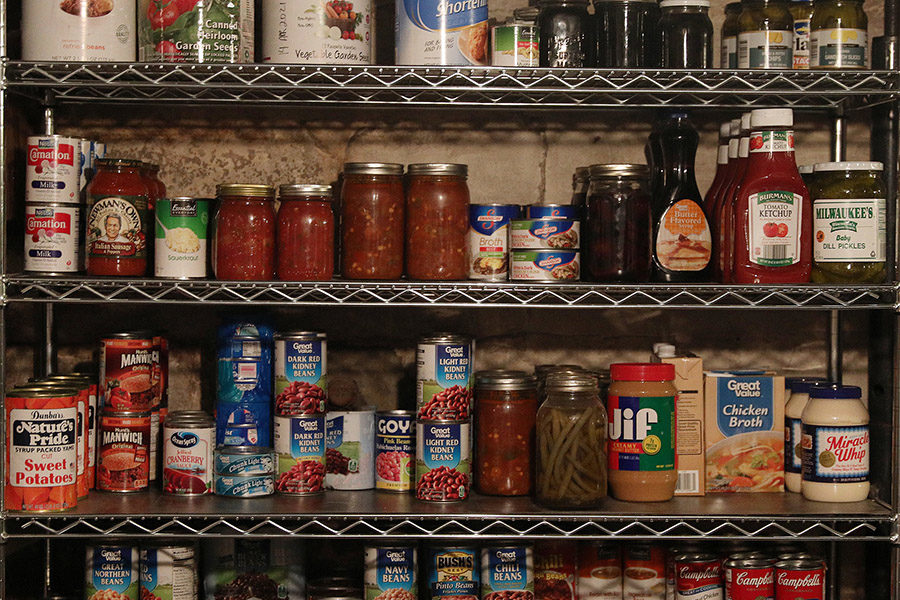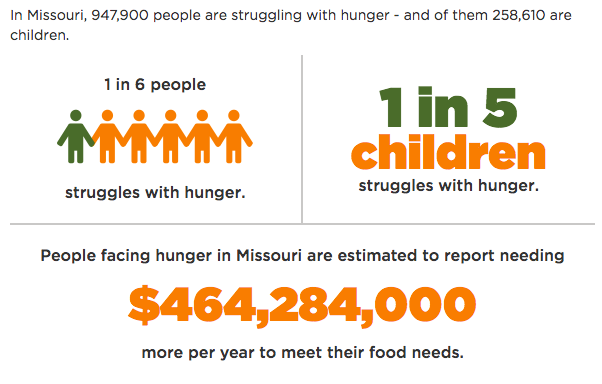Food For Thought Needs to be a Higher Priority for Students
Food insecurity is a major issue in Kansas City that students should care more about.
PHOTO | Tribune News Service
Canned goods and other non-perishable food items line the shelves.
Skits, prizes and spirited competition between grades characterize the weeks of Food For Thought, which began Oct. 26 and runs through Nov. 10. However, one major piece is missing: genuine care for the food insecure people that Redemptorist Social Services serves.
This may not seem like the case because homelessness was talked about in a video at the FFT assembly Oct. 27, student council slept outside to experience what the homeless go through and members of student council often bring up the issue when motivating their classes to bring in cans. However, if people truly cared about food insecurity, then why was the school’s participation decreased by 50 percent the past few years?
In 2012, the height of FFT’s success, the school raised over 20 tons of food for Redemptorist. Our school was a vital source of food for the pantry, and the people there came to depend on us. In 2015, however, we barely raised 10 tons. The goal this year is 8 tons, and still some students are pessimistic that we will reach it.
Last year, the freshmen and sophomore classes each raised a little over one ton. One explanation for the lack of participation is that there hasn’t been enough time for these classes to get into the school spirit surrounding FFT. However, this reveals a major problem– FFT is more motivated by the spirit of competition than genuine care for the poor in Kansas City. As these classes are now leaders of the freshmen, they need to pick up the slack.
Students need to care more about food insecurity in Kansas City. Poverty is a cyclical problem that is hard to escape, and a setback like illness or a car crash can send a poor family back into irreversible financial collapse. If there is no outside help, poor families can lose their homes, utilities, and medical care, according to Redemptorist. Since the school community is more affluent than most, students have a responsibility to acknowledge the problem and help in any way they can.
Since the entire school is part of FFT, it is easy for people to believe that their help doesn’t significantly contribute to the cause, and that their classmates will make up for their lack of participation. Students need to realize that their actions do have an impact, and that a decision to save money and not donate can result in another family going hungry.
Much of the food donated in FFT goes towards Thanksgiving meals. For most, this is a holiday for overconsumption. Students need to take time to remember those who don’t have any food on Thanksgiving and make a donation to FFT so that others can also have a great holiday experience. Beyond Thanksgiving, FFT is the main source of food for Redemptorist for the rest of the year, and students need to realize how important their participation is.
People go hungry in Kansas City more than students might expect. Since much of the school has grown up in food security, it is easy for many to forget that the problem exists in the city around us. In Missouri, almost 16 percent of people are food insecure, compared with the national average of 13 percent, according to Feeding America. Of the food insecure people in Kansas and Missouri, only about half qualify for federal aid in the form of food stamps.
People who are food insecure greatly benefit from donations of food because they spend their low incomes on other basic needs such as shelter, utilities, clothing, and transportation, according to Redemptorist. If students can donate enough to Redemptorist, then food insecure families will be able to focus more on meeting these needs instead of acquiring food.
Many of the people Redemptorist serves are unable to help themselves. Many are elderly, employed in jobs without opportunities for advancement or benefits, or mentally ill, according to Redemptorist. It is essential that students do what they can to help them out because many food insecure people have no control over their situations.
To meet these needs, there are many ways that students can raise cans. First, and most importantly, the school needs to adopt a generous mindset that is not simply about winning a competition. To obtain cans, students can go door to door asking for donations, fundraise, donate their own money and look for sales to get the most cans for their money. With the “season of giving” quickly approaching, students should think about how their actions affect others and not be complicit in the problem of food insecurity.




